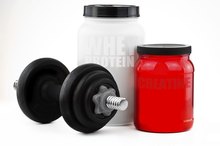Benefits & Side Effects of HMB
HMB, or beta-hydroxy beta-methylbutyric acid, is an active metabolite of the amino acid leucine, meaning a portion of leucine is metabolized into HMB once in the body. Leucine is the branched chain amino acid most responsible for protein synthesis, or muscle growth. HMB, in its supplemental from, is commonly used by bodybuilders or athletes who are interested in increasing the benefits of strength training.
If you are experiencing serious medical symptoms, seek emergency treatment immediately.
How It Works
According to a Vanderbilt University health psychology report, researchers concur that, although the mechanism by which HMB effects muscle function is still unknown, HMB may inhibit protein degradation during periods of resistance training. According to a study published in the European Journal of Applied Physiology, HMB, though not as effective as leucine in building muscle, is significantly more effective in preventing muscle breakdown. Therefore, it is marketed by most supplement manufacturers as an anti-catabolic agent as opposed to simply a muscle building supplement.
- According to a Vanderbilt University health psychology report, researchers concur that, although the mechanism by which HMB effects muscle function is still unknown, HMB may inhibit protein degradation during periods of resistance training.
- According to a study published in the European Journal of Applied Physiology, HMB, though not as effective as leucine in building muscle, is significantly more effective in preventing muscle breakdown.
Muscle Building
Health Benefits of Body Fortress Super Advanced Whey Protein
Learn More
HMB, though not as well known as other muscle building supplements, may turn out to be among the more effective in its realm. A study published in the Jul-Aug 2001 issue of the "Nutrition" journal found that HMB, when combined with creatine, significantly increased lean mass and strength gains 1. A review article, published in January 2008 in the "Nutrition & Metabolism" journal, indicates that multiple studies found that HMB had positive effects on strength, lean body composition and reduced soreness on trained athletes. The article also noted similar findings in untrained athletes. Supplementation and nutrition compendium Examine.com gives HMB an “A” rating for “power output” (based on an aggregate review of 12 studies) and “B” ratings for its effectiveness in lowering body fat and increasing lean mass (based on an aggregate review of eight studies) 4.
Other Benefits
A Iowa State University study published in the January 2003 issue of the "Journal of Applied Physiology" indicates that HMB resulted in a decrease in LDL, total cholesterol and systolic blood pressure. These positive effects on cholesterol and blood pressure imply that HMB could prove a useful tool in preventing heart disease and stroke, two diseases directly linked to high blood pressure and high cholesterol. However, more research is needed to determine HMB's role as a preventative health supplement.
Side Effects
Vitamin B16 Benefits
Learn More
Although limited research has been performed on humans, it appears that HMB is a safe supplement. However, the Vanderbilt report points out that HMB is a comparatively new supplement and consideration must be paid to possible side effects of upsetting a natural balance within the body. Examine.com notes that overall, normal doses of HMB seem to be tolerated well over extended periods of time 4.
Related Articles
References
- Nutrition Journal: Creatine and Beta-hydroxy-beta-methylbutyrate (HMB); Jówko E, et al.
- EAS: HMB
- Nutrition and Metabolism: Effects of beta-hydroxy-beta-methylbutyrate (HMB); Gabriel J Wilson, et al.
- Examine: HMB
- Iowa State University: Iowa State Study Rates Effectiveness of Dietary Supplements for Lean Mass and Strength Gain
- U.S. Department of Health and Human Services, U.S. Department of Agriculture. Appendix 7. Nutritional Goals for Age-Sex Groups Based on Dietary Reference Intakes and Dietary Guidelines Recommendations. 2020.
- American College of Sports Medicine. Protein Intake for Optimal Muscle Maintenance. 2015.
- Protein and Amino Acids. In: National Research Council (US) Subcommittee on the Tenth Edition of the Recommended Dietary Allowances. Recommended Dietary Allowances: 10th Edition. Washington, DC: National Academies Press (US); 1989.
- Mero A. Leucine Supplementation and Intensive Training. Sports Med. 1999;27(6):347-358. doi:10.2165/00007256-199927060-00001
- Kurpad AV, Regan MM, Raj T, Gnanou JV. Branched-Chain Amino Acid Requirements in Healthy Adult Human Subjects. J Nutr. 2006;136(1 Suppl):256S-263S. doi:10.1093/jn/136.1.256S
- Mobley CB, Haun CT, Roberson PA, et al. Effects of Whey, Soy or Leucine Supplementation with 12 Weeks of Resistance Training on Strength, Body Composition, and Skeletal Muscle and Adipose Tissue Histological Attributes in College-Aged Males. Nutrients. 2017;9(9):972. doi:10.3390/nu9090972
- Aguiar AF, Grala AP, Da Silva RA, et al. Free leucine supplementation during an 8-week resistance training program does not increase muscle mass and strength in untrained young adult subjects. Amino Acids. 2017;49(7):1255-1262. doi:10.1007/s00726-017-2427-0
- Devries MC, McGlory C, Bolster DR, et al. Leucine, Not Total Protein, Content of a Supplement Is the Primary Determinant of Muscle Protein Anabolic Responses in Healthy Older Women. J Nutr. 2018;148(7):1088-1095. doi:10.1093/jn/nxy091
- Layman DK. The Role of Leucine in Weight Loss Diets and Glucose Homeostasis. J Nutr. 2003;133(1):261S-267S. doi:10.1093/jn/133.1.261S
- Layman DK, Walker DA. Potential Importance of Leucine in Treatment of Obesity and the Metabolic Syndrome. J Nutr. 2006;136(1 Suppl):319S-323S. doi:10.1093/jn/136.1.319S
- University of Arkansas Division of Agriculture. Leucine serves an important role for health, but needs to eaten as part of a complete protein. 2015.
- American Association for the Advancement of Science. Research from Everest: Can leucine help burn fat and spare muscle tissue during exercise? 2011.
- Duan Y, Li F, Li Y, et al. The role of leucine and its metabolites in protein and energy metabolism. Amino Acids. 2016;48(1):41-51. doi:10.1007/s00726-015-2067-1
Writer Bio
Clay McNight is currently a nutrition writer with Demand Media Studios.








